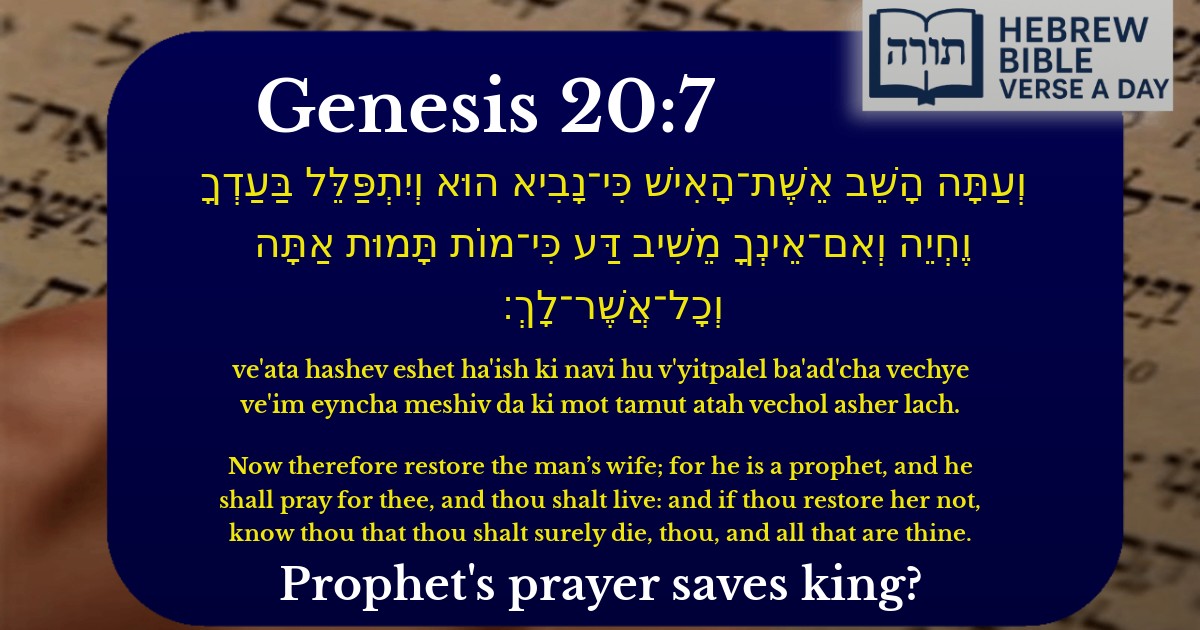Join Our Newsletter To Be Informed When New Videos Are Posted
Join the thousands of fellow Studends who rely on our videos to learn how to read the bible in Hebrew for free!
Hebrew Text
וְעַתָּה הָשֵׁב אֵשֶׁת־הָאִישׁ כִּי־נָבִיא הוּא וְיִתְפַּלֵּל בַּעַדְךָ וֶחְיֵה וְאִם־אֵינְךָ מֵשִׁיב דַּע כִּי־מוֹת תָּמוּת אַתָּה וְכָל־אֲשֶׁר־לָךְ׃
English Translation
Now therefore restore the man’s wife; for he is a prophet, and he shall pray for thee, and thou shalt live: and if thou restore her not, know thou that thou shalt surely die, thou, and all that are thine.
Transliteration
Ve'ata hashev eshet ha'ish ki navi hu v'yitpalel ba'ad'cha vechye ve'im eyncha meshiv da ki mot tamut atah vechol asher lach.
Hebrew Leining Text
וְעַתָּ֗ה הָשֵׁ֤ב אֵֽשֶׁת־הָאִישׁ֙ כִּֽי־נָבִ֣יא ה֔וּא וְיִתְפַּלֵּ֥ל בַּֽעַדְךָ֖ וֶֽחְיֵ֑ה וְאִם־אֵֽינְךָ֣ מֵשִׁ֔יב דַּ֚ע כִּי־מ֣וֹת תָּמ֔וּת אַתָּ֖ה וְכׇל־אֲשֶׁר־לָֽךְ׃
וְעַתָּ֗ה הָשֵׁ֤ב אֵֽשֶׁת־הָאִישׁ֙ כִּֽי־נָבִ֣יא ה֔וּא וְיִתְפַּלֵּ֥ל בַּֽעַדְךָ֖ וֶֽחְיֵ֑ה וְאִם־אֵֽינְךָ֣ מֵשִׁ֔יב דַּ֚ע כִּי־מ֣וֹת תָּמ֔וּת אַתָּ֖ה וְכׇל־אֲשֶׁר־לָֽךְ׃
🎵 Listen to leining
Parasha Commentary
📚 Talmud Citations
This verse is quoted in the Talmud.
The verse is referenced in the context of discussing the importance of heeding the words of a prophet and the consequences of not doing so.
📖 Sanhedrin 89b
The verse is cited in a discussion about the nature of prophecy and the obligations of those who receive prophetic warnings.


Context of the Verse
This verse (Bereshit 20:7) appears in the narrative where Avimelech, king of Gerar, takes Sarah, believing her to be Avraham's sister rather than his wife. Hashem appears to Avimelech in a dream, warning him to return Sarah to Avraham, emphasizing Avraham's role as a prophet and the consequences of disobedience.
Avraham as a Prophet (נָבִיא)
Rashi explains that the term "נָבִיא" (prophet) here highlights Avraham's unique relationship with Hashem. Unlike other righteous individuals, Avraham was granted the ability to communicate directly with Hashem and intercede on behalf of others. The Rambam (Hilchos Yesodei HaTorah 7:1) teaches that prophecy is a divine gift granted to those who have perfected their intellect and character, fitting Avraham's spiritual stature.
The Power of Avraham's Prayer
The phrase "וְיִתְפַּלֵּל בַּעַדְךָ וֶחְיֵה" ("he shall pray for thee, and thou shalt live") underscores the efficacy of a tzaddik's prayer. The Talmud (Bava Metzia 85b) relates that the prayers of the righteous can overturn harsh decrees. Avimelech is told that only through Avraham's intercession can he avoid punishment, demonstrating the merit of Avraham's spiritual influence.
Severity of the Warning
The warning "כִּי־מוֹת תָּמוּת אַתָּה וְכָל־אֲשֶׁר־לָךְ" ("thou shalt surely die, thou, and all that are thine") is a grave consequence for failing to heed Hashem's command. The Midrash (Bereishit Rabbah 52:9) explains that Avimelech and his household were already afflicted with infertility (as mentioned in Bereshit 20:17-18), showing that divine retribution had begun. The Sforno adds that this warning was not just about physical death but also spiritual consequences for opposing Hashem's will.
Moral Lesson: Respect for Marriage